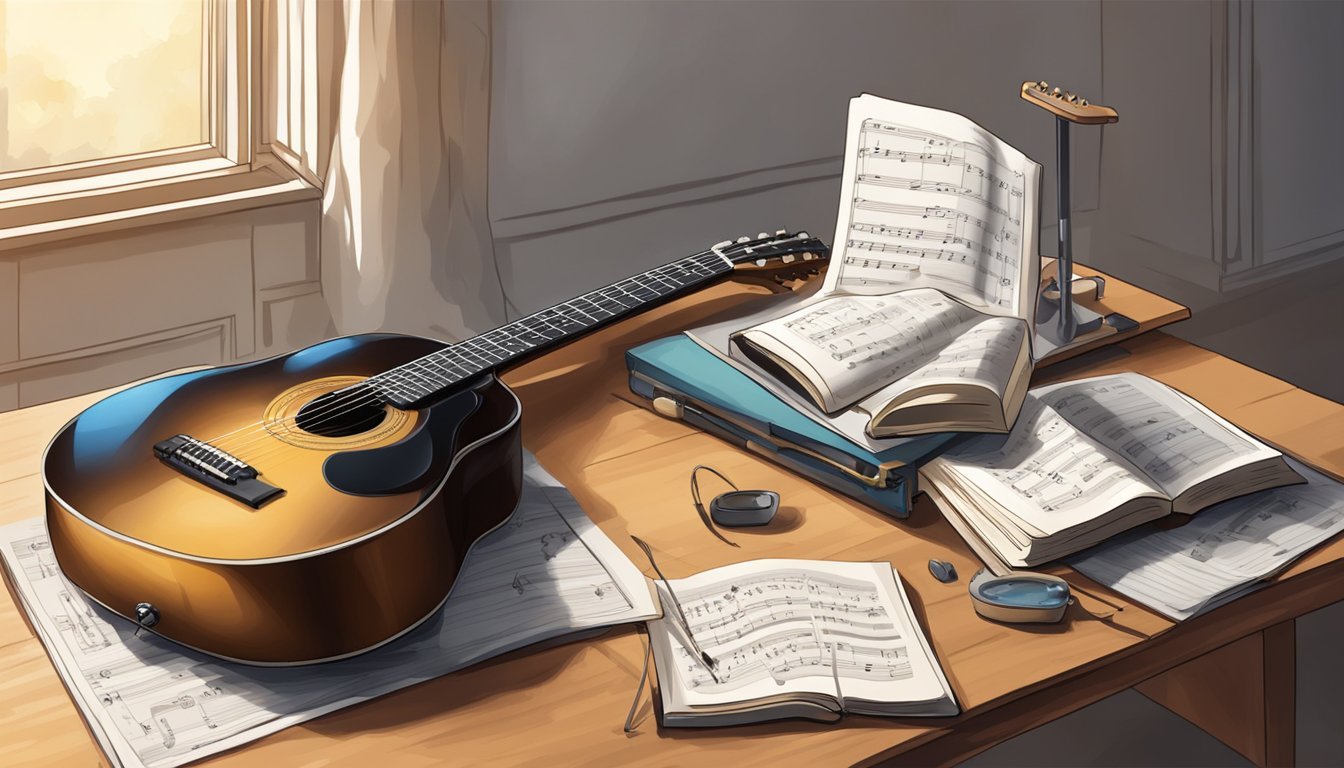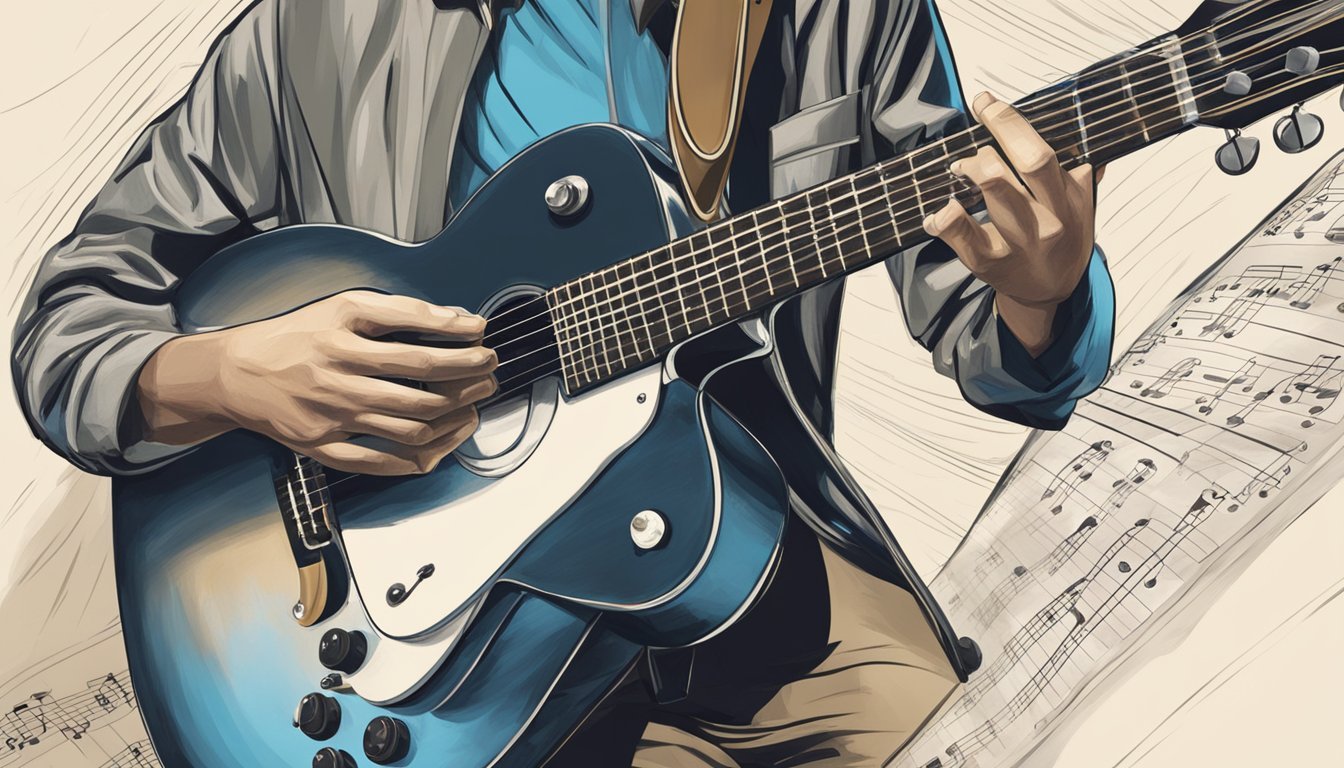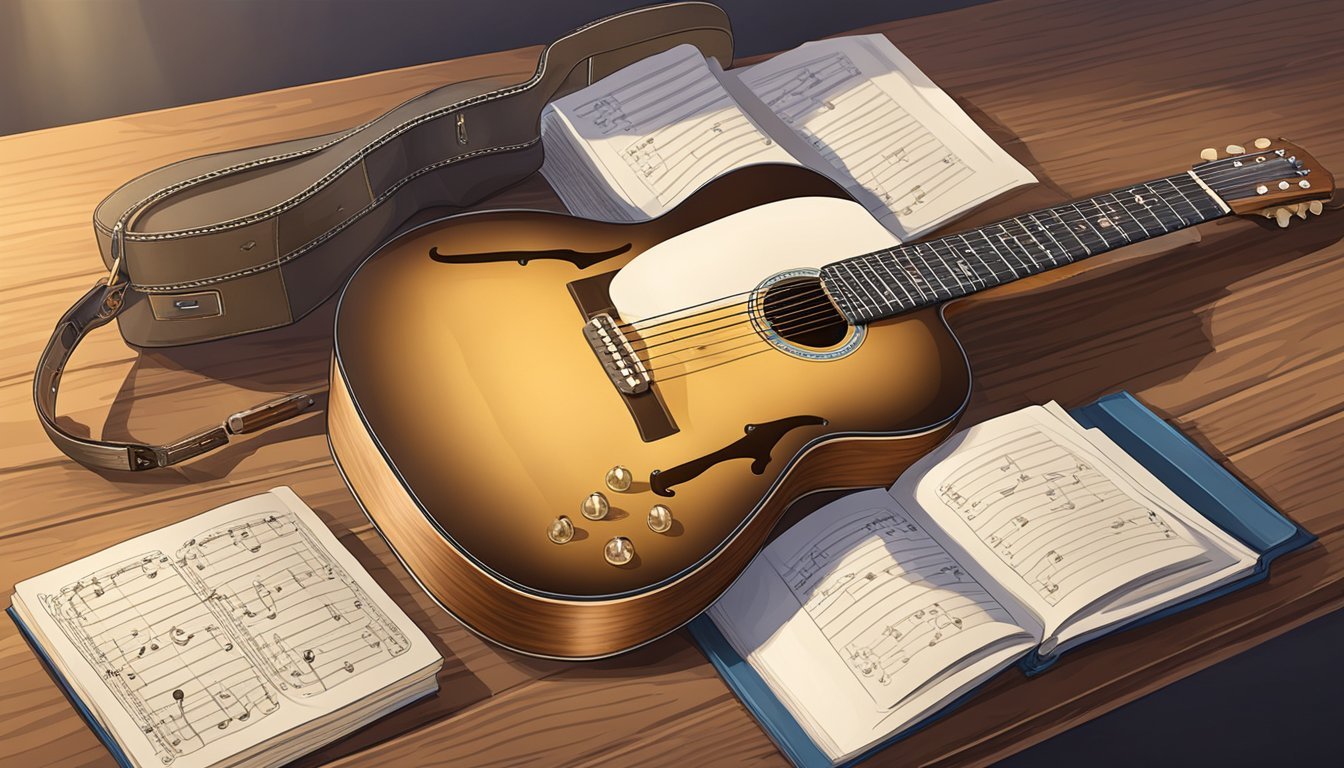Learning to play the guitar can be an exciting journey filled with music and creativity. Most people can start playing basic songs within a few months.
It may take several years to master advanced techniques. The timeline for your progress often depends on your practice habits and the time you dedicate each week.

As you dive into learning the guitar, you’ll find that developing a solid practice routine is key to your growth.
Whether you’re strumming along to your favorite tunes or working through chord changes, consistency will help you see real improvements.
To help you get a clearer picture of what to expect on your guitar journey, let’s break down the essential aspects that contribute to your progress.
Key Takeaways
- Consistent practice is crucial for improvement on the guitar.
- Starting with simple songs can make learning enjoyable.
- Progress takes time, but setting realistic goals helps you stay motivated.
Getting Started with Guitar
Starting your guitar journey is exciting! You’ll want to choose the right instrument and understand some basics to set yourself up for success.
Choosing the Right Guitar
Selecting the right guitar is key to your learning experience.
Think about what type suits you—acoustic, electric, or classical.
- Acoustic: Great for beginners since you don’t need extra equipment. They sound lovely and are very portable.
- Electric: These guitars are easier on the fingers and offer a wide range of sounds. However, you’ll need an amplifier.
- Classical: They have nylon strings, which are softer on the fingers and good for fingerstyle techniques.
Consider your music interests and try playing a few different types before buying.
Check your budget too.
There are plenty of affordable beginner options.
Understanding the Fundamentals
Once you have your guitar, it’s time to learn the basics.
Start with a few basic chords like G, C, D, and E minor.
These will help you play many simple songs.
Practice regularly, even if it’s just 10-15 minutes a day.
This helps build muscle memory and improves your skills.
Focus on your finger placement and strumming technique.
It’s also essential to learn about tuning.
A properly tuned guitar sounds better and helps you train your ear.
You can use a tuner or tuning apps to make this easier.
Remember, each practice session gets you closer to playing your favorite songs!
Creating a Practice Routine
A solid practice routine can help you improve your guitar skills quickly.
By scheduling practice sessions and setting achievable goals, you’ll make steady progress.
Let’s dive into how to create a routine that works for you.
Scheduling Practice Sessions
It’s important to set aside regular practice time.
Aim for at least 30 minutes to an hour most days.
Consistency matters more than long hours.
Try to schedule your practice sessions at the same time each day.
This helps create a habit.
Whether it’s after school or before dinner, find a time that fits your lifestyle.
Use a calendar or an app to plan your practice.
Mark your sessions to keep track of your progress.
Also, don’t forget to take breaks.
A short break every 15-20 minutes can help keep your mind fresh.
Setting Achievable Goals
When you practice, make sure your goals are clear and specific.
Instead of saying, “I want to get better,” try “I want to learn the C major scale by next week.”
Break larger goals into smaller, realistic steps.
For example, if you want to learn a new song, focus on one section at a time.
Set a goal to master that section before moving on.
Write down your goals and check them off as you achieve them.
This gives you a sense of accomplishment, encouraging you to keep going.
Remember, dedicated practice is key to seeing improvement over time.
Advancing Your Guitar Skills

As you grow your guitar skills, you’ll want to focus on chords, scales, and techniques to take your playing to a higher level.
Mastering these areas opens up a world of music for you to explore.
Learning Chords and Scales
Start by expanding your chord library.
Focus on learning barre chords.
They are essential for playing many songs and can be tricky at first, but they build strength in your fingers.
Once you’re comfortable with basic chords, explore chord progressions like I-IV-V. This will help you understand how songs are structured.
Next, dive into scales.
The major scale is a good starting point, as it is used in many songs.
Practice it in different keys to get familiar with the fretboard.
Don’t forget the minor scale, as it gives a different feel and is essential for many genres.
Mastering Strumming and Picking Techniques
Strumming can change the vibe of a song.
Experiment with different strumming patterns.
Start with simple downstrokes and then mix in upstrokes.
Listen to your favorite songs to pick up unique patterns.
Once you have your strumming down, try picking techniques.
Alternate picking gives your solos speed and clarity.
Fingerpicking can add a beautiful texture.
Practice with simple riffs and build complexity over time.
Progressing to Complex Solos
After you feel confident with chords and strumming, it’s time for solos.
Start by learning some simple, popular solos in the style you like.
Focus on your finger positioning and timing.
Try using scales for soloing.
The major and minor scales will help you create melodies.
Once you’re comfortable, challenge yourself with advanced techniques like bending notes, slides, and hammer-ons.
These can add flair and emotion to your playing.
Practice regularly, and soon enough, you’ll notice improvement.
Enjoy the journey!
Measuring Your Progress

Tracking your growth as you learn guitar is essential.
It helps you understand your pace and what factors influence your skill level.
You’ll identify strengths and areas that need more work.
The Role of Talent and Effort
Your talent plays a part in your guitar journey, but effort is crucial.
Some people pick up new skills quickly, while others may need more time.
Consistency is key.
Practicing regularly, even for short sessions, builds a solid foundation.
Aim for at least 15 to 30 minutes a day.
Track your practice hours.
For example, after about 150 hours, you should be able to play simple songs.
Keep a log of your practice to see improvements over time.
Remember, everyone learns differently.
Focus on your own path and enjoy the learning process.
Celebrate small victories along the way.
Benchmarking Against Guitar Milestones
Setting concrete guitar goals can guide your practice.
Milestones can help you measure your progress.
Start with basics like learning open chords.
Aim to play simple songs within your first few months.
After mastering chords, you can tackle strumming patterns and fingerpicking.
Use a checklist to track these milestones.
For instance:
- 0-3 Months: Learn basic open chords (C, G, D).
- 3-6 Months: Play simple songs.
- 6-12 Months: Achieve proficiency in basic strumming patterns.
This helps you see how far you’ve come and what to focus on next.
Remember, it’s about enjoying your journey while measuring your growth.
Frequently Asked Questions
You might have some questions about learning guitar, especially if you’re just starting out.
Here’s some straightforward info to help clear things up.
What’s the usual time frame for a beginner to pick up the basics of guitar?
On average, it takes about 2 to 6 months for beginners to learn the basics.
This includes understanding simple chords, notes, and maybe even playing a few songs.
It really depends on how much you practice.
For those wondering how long to learn guitar, it’s important to note that consistent practice and dedication can significantly speed up the learning process.
As beginners start to build their skills, they may also discover their preferred style of music, which can further motivate their practice sessions.
Ultimately, the journey is unique for each individual, and enjoyment plays a crucial role in progress.
Is it realistic to play guitar decently after only three months?
Yes, it is possible to sound decent after three months of consistent practice.
If you practice regularly and focus on the right techniques, you can play basic songs and chords fairly well in that time.
Can practicing for 30 minutes a day actually lead to solid guitar skills?
Definitely! Practicing for 30 minutes each day can lead to noticeable improvements.
Regular practice helps build muscle memory and understanding of the guitar.
How quickly can someone learn to strum some cool chords on an acoustic guitar?
You can start strumming some cool chords within a few weeks.
If you focus on a couple of simple chord progressions, you’ll be surprised at how fast you can play along with your favorite songs.
What’s a reasonable amount of time to dedicate to learning guitar to get really good?
To get really good, you’ll want to practice for at least 30 to 60 minutes most days.
Dedicating time like this over a few years can help you develop strong skills.
For electric guitar newbies, how long until they can rock out some tunes?
New electric guitar players can start rocking out in just a few months.
Focus on easier riffs and power chords to get started.
You’ll be playing fun tunes before you know it.

